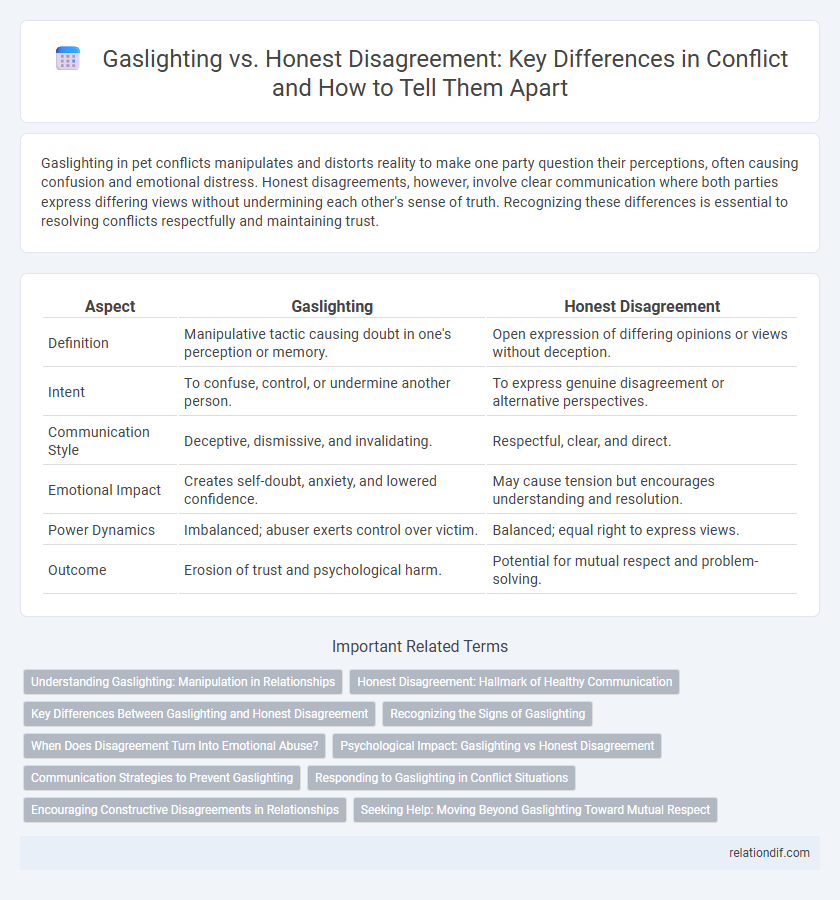Gaslighting in pet conflicts manipulates and distorts reality to make one party question their perceptions, often causing confusion and emotional distress. Honest disagreements, however, involve clear communication where both parties express differing views without undermining each other's sense of truth. Recognizing these differences is essential to resolving conflicts respectfully and maintaining trust.
Table of Comparison
| Aspect | Gaslighting | Honest Disagreement |
|---|---|---|
| Definition | Manipulative tactic causing doubt in one's perception or memory. | Open expression of differing opinions or views without deception. |
| Intent | To confuse, control, or undermine another person. | To express genuine disagreement or alternative perspectives. |
| Communication Style | Deceptive, dismissive, and invalidating. | Respectful, clear, and direct. |
| Emotional Impact | Creates self-doubt, anxiety, and lowered confidence. | May cause tension but encourages understanding and resolution. |
| Power Dynamics | Imbalanced; abuser exerts control over victim. | Balanced; equal right to express views. |
| Outcome | Erosion of trust and psychological harm. | Potential for mutual respect and problem-solving. |
Understanding Gaslighting: Manipulation in Relationships
Gaslighting is a form of psychological manipulation where one person distorts facts to make the other doubt their reality, often leading to confusion and decreased self-esteem. Unlike honest disagreements which stem from differing perspectives and facts, gaslighting intentionally undermines a person's perception to gain control or power in relationships. Recognizing behaviors like denial, misinformation, and blame-shifting is crucial to distinguishing gaslighting from genuine conflict and protecting mental health.
Honest Disagreement: Hallmark of Healthy Communication
Honest disagreement serves as a hallmark of healthy communication by fostering open dialogue rooted in mutual respect and trust. Unlike gaslighting, which manipulates and distorts reality to undermine the other person's perception, honest disagreement embraces differing viewpoints without invalidation or deception. This practice encourages critical thinking and emotional intelligence, promoting constructive conflict resolution and stronger interpersonal relationships.
Key Differences Between Gaslighting and Honest Disagreement
Gaslighting is a manipulative tactic that distorts reality to make someone doubt their perceptions, often involving denial, misdirection, and trivializing feelings, while honest disagreement respects differing viewpoints without undermining the other person's experience. Key differences include intent, where gaslighting aims to control or confuse, and honest disagreement serves to exchange ideas or resolve conflicts constructively. Recognizing these distinctions is crucial to maintaining healthy communication and preventing emotional abuse in conflicts.
Recognizing the Signs of Gaslighting
Gaslighting involves manipulating someone into doubting their reality through persistent denial, misinformation, and distortion, often causing confusion and self-doubt. Recognizing signs includes frequent invalidation of one's feelings, relentless blame-shifting, and contradictory statements that erode trust. Honest disagreement, by contrast, respects differing perspectives without undermining the other person's sense of reality or sanity.
When Does Disagreement Turn Into Emotional Abuse?
Disagreement turns into emotional abuse when one party consistently manipulates facts to distort the other's reality, eroding their sense of truth and self-worth. Gaslighting involves deliberate lying and psychological manipulation to gain control, whereas honest disagreement respects differing perspectives without undermining a person's mental stability. Recognizing patterns of coercion, denial of experiences, and persistent invalidation is crucial to distinguishing emotional abuse from normal conflict.
Psychological Impact: Gaslighting vs Honest Disagreement
Gaslighting inflicts severe psychological damage by undermining an individual's sense of reality, often leading to confusion, anxiety, and diminished self-esteem. Honest disagreement promotes critical thinking and emotional resilience, enabling individuals to engage in healthy conflict resolution without questioning their own perceptions. Understanding the psychological impact of gaslighting versus honest disagreement is crucial for maintaining mental well-being in conflict situations.
Communication Strategies to Prevent Gaslighting
Effective communication strategies to prevent gaslighting emphasize clear, assertive expression of thoughts and feelings without manipulation or distortion of facts. Utilizing active listening techniques and validating each other's perspectives fosters a respectful dialogue, crucial for distinguishing honest disagreement from psychological abuse. Establishing boundaries and encouraging transparency empowers individuals to address conflicts constructively, reducing the risk of gaslighting dynamics.
Responding to Gaslighting in Conflict Situations
Responding to gaslighting in conflict situations requires recognizing manipulative tactics such as denial, distortion, and trivializing concerns that undermine one's perception of reality. Maintaining clear, evidence-based communication and documenting incidents help counteract gaslighting's psychological effects and preserve mental clarity. Seeking support from trusted individuals or professionals establishes external validation and reduces isolation caused by gaslighting behaviors.
Encouraging Constructive Disagreements in Relationships
Encouraging constructive disagreements in relationships involves recognizing the difference between gaslighting and honest disagreement by promoting open communication and mutual respect. Gaslighting distorts reality and undermines confidence, while honest disagreements allow partners to express differing opinions without manipulation. Establishing clear boundaries and fostering an environment where each person feels heard supports healthy conflict resolution and strengthens relational trust.
Seeking Help: Moving Beyond Gaslighting Toward Mutual Respect
Seeking help in conflicts involving gaslighting requires recognizing patterns of manipulation and validating one's own perception before engaging in dialogue. Honest disagreement is characterized by respect for differing viewpoints and a willingness to understand, which fosters constructive communication and conflict resolution. Moving beyond gaslighting toward mutual respect involves setting clear boundaries, encouraging open communication, and possibly involving neutral mediators or counselors to support healthy interactions.
Gaslighting vs Honest disagreement Infographic

 relationdif.com
relationdif.com